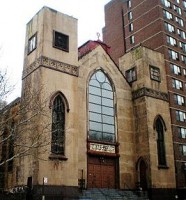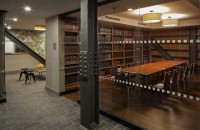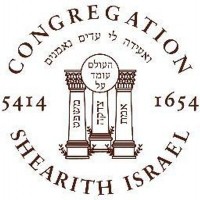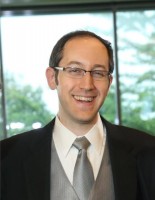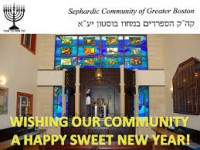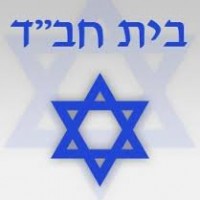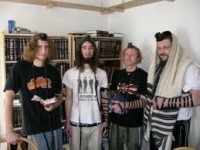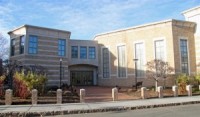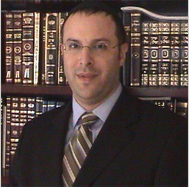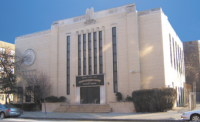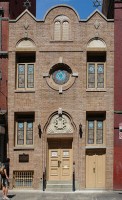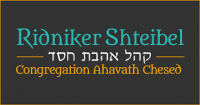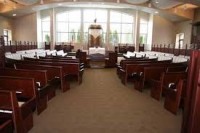Shacharit Mincha/Maariv
Sunday 8:30 am
Weekday 7:00 am
Friday evening sundown
Shabbos morning 9:15 am
Montefiore Orthodox Synagogue
460 Westford Street
Lowell, MA 01851
(978) 459-9400
B"H Shalom! Montefiore Synagogue (previously known as Montefiore Society Synagogue ), the oldest synagogue in Lowell, Massachusetts was established in 1896. It relocated to Westford Street in 1971, after merging with Anshe Sfard Synagogue in 1969.
Lowell, is a great place for Orthodox Jews! We have a small close-knit Jewish community dedicated to preserving and enhancing Jewish life in the Merrimack Valley region. Lowell, Massachusetts is located off the junction of Routes 3 and 495, and is conveniently located in the high-tech region of Boston Routes 128/95 and 93. Boston is just a 45-minute drive from us and New Hampshire is just 10 minutes north of us. Lowell is home to a minor league baseball team, the Spinners , and hockey team, the Lock Monsters. Lowell has quite a number of cultural and theatrical venues, the Lowell Memorial Auditorium, the Tsongas Arena, and the Merrimack Repertory Theatre to name a few.
Park East Synagogue is dedicated to providing the opportunity for spiritual growth, Jewish education and spiritual comfort for individuals, families, and our community.
Park East Synagogue is inclusive of all people seeking a meaningful Jewish life, regardless of degree of observance, knowledge of Jewish tradition, age, or affiliation.
Park East Synagogue is committed to providing inspiring Jewish and general studies education to children and to adults; its Religious School, Early Childhood, and Day School with its emphasis on cultivating a Jewish life rich in tradition and unrivalled in general studies has been, and continues to be, a source of character and vitality for its congregation.
The synagogue’s influence, strength and dynamism in the community derive from the members of our congregation. We value and honor the role our congregants fulfill in defining and shaping our future and that of the Jewish community, in New York City and beyond.
Shacharit
February 28 at 9:00 am EST
February 29 at 7:45 am EST
March 1 at 7:45 am EST
Mincha
February 28 at 5:40 pm EST
February 29 at 5:40 pm EST
March 1 at 5:40 pm EST
I'm not going to leave a synagogue less than a five star but I'm a little confused why I was kicked off the steps of the back entrance. I have never seen anyone come in or go out that way. I'm Jewish. There are cameras everywhere and a Police station a few doors down. They are not paticularly comfortable steps to sit on. The reason I like to sit on those steps is because it's a temple and also because it's close to Police. A few criminals are paying people to harass me every day and when I'm on those steps is the only time they leave me alone. Thanks guys
Not to be confused with Beth Hamedrash Hagadol Anshe Ungarn, "Great House of Study of the People of Hungary", a Lower East Side congregation founded in 1883 by Hungarian Jews.
Beth Hamedrash Hagodo: בֵּית הַמִּדְרָש הַגָּדוֹל, "Great Study House "is an Orthodox Jewish congregation that for over 120 years was located in a historic building at 60–64 Norfolk Street between Grand and Broome Streets in the Lower East Side neighborhood of Manhattan, New York City. It was the first Eastern European congregation founded in New York City and the oldest Russian Jewish Orthodox congregation in the United States.
Founded in 1852 by Rabbi Abraham Ash as Beth Hamedrash, the congregation split in 1859, with the rabbi and most of the members renaming their congregation Beth Hamedrash Hagodol. The congregation's president and a small number of the members eventually formed the nucleus of Kahal Adath Jeshurun, also known as the Eldridge Street Synagogue. Rabbi Jacob Joseph, the first and only Chief Rabbi of New York City, led the congregation from 1888 to 1902.Rabbi Ephraim Oshry, one of the few European Jewish legal decisors to survive the Holocaust, led the congregation from 1952 to 2003.
The congregation's building, a Gothic Revival structure built in 1850 as the Norfolk Street Baptist Church and purchased in 1885, was one of the largest synagogues on the Lower East Side. It was listed on the National Register of Historic Places in 1999. In the late 20th century the congregation dwindled and was unable to maintain the building, which had been damaged by storms. Despite their obtaining funding and grants, the structure was critically endangered.
The synagogue was closed in 2007. The congregation, reduced to around 20 regularly attending members, was sharing facilities with a congregation on Henry Street The Lower East Side Conservancy was trying to raise an estimated $4.5 million for repairs of the building, with the intent of converting it to an educational center. In December the leadership of the synagogue under Rabbi Mendel Greenbaum filed a “hardship application” with the Landmarks Preservation Commission seeking permission to demolish the building to make way for a new residential development. This application was withdrawn in March 2013, but the group Friends of the Lower East Side described Beth Hamedrash Hagodol's status as "demolition by neglect"
בבית חב"ד תמצא בית כנסת, הכנה לנישואין, שיעורי יהדות אישיים, בדיקת תפילין ומזוזות, שיעורי תורה לגברים ונשים, סידור קידושין, שירותים/השאלת מזוזות.
Chabad House Bowery is enabling and inspiring young Jews to take responsibility for creating a bright personal and communal Jewish future.
We are building a movement to bring healing to the world.
Our vision is for Chabad House Bowery to carry out the Jewish mission with boundless love, deep inspiration, creativity and style.
קהילת שארית ישראל נוסדה במנהטן, ניו יורק בשנת 1654, על ידי מגורשי ספרד ופורטוגל, ונחשבת לקהילה היהודית הוותיקה בארצות הברית. בית הכנסת של הקהילה, המכונה גם "ספרדי-פורטוגזי" ("Spanish and Portuguese"), מתפקד כאורתודוקסי. ממוקם ברחוב 70 (מערב), ניו יורק.
הקהילה נוסדה ב-1654 על ידי 23 מהגרים יהודיים, שבאו מברזיל, ונחשבת לקהילה היהודית הממוסדת הראשונה בארצות הברית.[דרוש מקור] במשך השנים, השתתפו חברי הקהילה במאבק למען זכויות אזרחיות ליהודי ארצות הברית, ובהדרגה השיגו את מבוקשם. מכיוון שהקהילה הייתה הקהילה היהודית היחידה בעיר ניו יורק עד שנת 1825, שארית ישראל תפקדה בתור המרכז של החיים היהודיים, סיפקה מקום לתפילה ולימוד – הן חילוני והן תלמוד תורה, כמו גם מקום לשירותים דתיים (אוכל כשר, מקווה וכו') ומפגשים חברתיים.
Weekday Services January 31 – February 5, 2016 5776 – Mishpatim – Sunday – Friday – January 31 – February 5, 2016
SCHEDULE
Morning Services
Sunday 8:00 am
Monday – Friday 7:15 am
Sunday – Thursday 6:30 pm
Shabbat Services February 5 – 6, 2016 Mishpatim – 5776 – Friday Eve & Saturday – February 5 – February 6, 2016
SCHEDULE
Friday
Candle Lighting 5:00 pm
Services 5:00 pm
Saturday
Morning Services 8:15 – 11:45 am
Torah Reading: Mishpatim
Seuda Shelishit & Class 3:55 pm
Minhah & Arbit 4:55 pm
Sunset 5:19 pm
Habdalah 5:48 pm
Historic Shaare Zedek Synagogue
For over a century, Congregation Shaare Zedek has served the Orthodox Jewish community
of northern Hudson County in New Jersey, including West New York, Guttenberg, North Bergen, Weehawken and Union City.
In 2012 we celebrated our Centennial. Some of our families have been with us since the beginning over a hundred years ago.
If you are part of our history, we invite you to contribute your story to our virtual book.
If you are new to Shaare Zedek we welcome you with open arms.
The synagogue is temporarily closed while we fix some building code violations and settle some fines.
When we reopen, we have services on Shabbat at 9:30 AM, and also on Jewish holidays.
We often have maariv on Friday – call us to check on the status: (201) 867-6859
Our Hebrew School
We create and environment that brings Judaism to life, fosters creativity and supports your child's unique style of learning. We use a unique approach which is hands-on and stimulates your child's intellect. Our curriculum has been designed to make a lasting, positive impact on the life of your child.
Judaism Comes Alive
Through drama, song art and stories we bring Judaism to life. OUr innovative methods make learning fun and memorable. We teach history by showing Jewish history, a method that encourages critical thinking. Through our mitzvah curriculum we emphasize each mivtzah's meaning for everyday life, in addition to the how-to ritual observance. Our hebrew language ensures that your child will be able to read from a Siddur (prayer book) No matter what synagogue your child affiliates with later in life, she or he will share the language of prayer with Jews around the world.
Our Staff
Our Hebrew School prides itself in our staff. Staff members are imbued with a desire to impart their love and knowledge of Judaism to their students. Recognizing that Hebrew School is an academic after-school program in addition to their regular school hours, our teachers endeavor to create an engaging program that keeps the interest of the child.
Educational Philosophy
Yeshiva Academy is founded on the principles of Chabad philosophy, which is a way of life that integrates the love of G‑d, intellectual knowledge and understanding of the Torah, and the appreciation of the uniqueness of every individual of the community.
Our administration and staff implement this philosophy in all areas of Judaic and General Studies while fostering a supportive environment for all our students.
Holistic growth in academic, spiritual, moral and social/emotions domains
Rigorous academics are pursued with a recognition that our students possess a variety of learning styles and abilities.
Students are taught to apply academic lessons from their practical settings to their daily lives.
Respect for each individual unique identity and talents forms the core of enhancing our students’ sense of self.
Ethics and moral values are explicitly taught, modeled, and practiced throughout the daily life of school.
Yeshiva teachers help our students realize that the Judaic and Secular worlds are interconnected.
Faculty strives to inspire and motivate each child to enjoy learning and a accept challenges while stimulating critical thought processes.
By empowering the head, heart, and soul, a Yeshiva education provides our students with knowledge, skills and attitudes necessary to be successful and to become members of con
Your most heroic acts are those of which you may not even be aware.
Like the time you could have gotten even with the guy in the next cubicle, and nobody would have known. And you really wanted to. But you didn’t, just because it’s not right.
You may not have been impressed—you may even have been disappointed with yourself. But the angels burst into song, as all your world rose up a notch. It may have been the most elevating act of a lifetime.
Heroic acts are not heroic if they’re second nature. It’s when you break out of your nature that you enter the realm of the divine.
B"H We are all heros. We are all filled with the glory of God.
The difference between "the best of us and the worst of us" is a VERY fine line and moves with time.
Redemption and return to God is just a moment and thought away. A desire.
Rv. Freeman, the lessons are from God, with your sweet expression.
Thanks to God, through you on this Thanksgiving day.
Shalom,
how great to know that not only in general we are important, but every moment of our life!! we are the main actor and HASHEM is our main audience and our "Oscar" is His approval and joy.
Rabbi Yosie Levine joined The Jewish Center's rabbinic team in 2004. He earned a BA in English and Comparative Literature from Columbia College and was awarded the university's William F. Curtis award for outstanding oratory. A Wexner Graduate Fellow, Rabbi Levine received rabbinic ordination from the Rabbi Isaac Elchanan Theological Seminary and was the winner of RIETS' writing prize. He holds an MPA in Public Policy from NYU's Robert F. Wagner Graduate School and is currently pursuing a doctoral degree in Modern Jewish History at Yeshiva University's Bernard Revel Graduate School. Rabbi Levine served as Rabbinic Intern, Assistant Rabbi and Associate Rabbi at The Jewish Center where he received practical rabbinic training and mentoring from Rabbi Ari Berman. Before joining the Center, he served as the educational director of the Lauder Foundation's Beit Midrash in Berlin, Germany and as the visiting scholar of Congregation Knesseth Israel in Birmingham, Alabama. Rabbi Levine has taken a leadership role on the issue of day school affordability and serves as the chair of Manhattan Day School's Political Advocacy Committee. He is co-chair of the Manhattan Eruv and is active in numerous communal organizations including AIPAC and the Beth Din of America and serves on the Board of UJA-Federation of New York. Rabbi Levine's wife, Rachel, is a clinical psychologist in private practice in Manhattan. They are the proud parents of Akiva, Yehoshua, Ari and Judy.
Rabbi Dovid Zirkind, a native of Baltimore, Maryland, joined The Jewish Center clergy in July 2012. After two years of study at Yeshivat Kerem B’Yavneh in Israel, Dovid continued his education at Yeshiva University. There he received his undergraduate degree in Psychology, graduating from the Yeshiva Program with honors. Upon graduation, Rabbi Zirkind attended the Rabbi Isaac Elchanan Theological Seminary, studying in the Marcos and Adina Katz Kollel. In 2010, Rabbi Zirkind joined the Yeshiva University Torah MiTzion Beit Midrash of Toronto, where he studied full time in the Beit Midrash and served as Rabbinic Assistant at Shaarei Shomayim Congregation. In that role, Rabbi Zirkind taught classes throughout the Greater Toronto Area, crafted programs and curricula for adults, college students and children alike and trained under a number of the communities leading Rabbis.
In his role as Assistant Rabbi of The Jewish Center, Rabbi Zirkind services the full gamut of our membership. He is the director of our Adult Education program, Jewish Center University, leads our daily minyanim and heads our Young Leadership Minyan and programming. Internally, Rabbi Zirkind teaches a number of ongoing classes and shiurim, including Talmud, Contemporary Ethics and Jewish Law. He believes that passionate Torah Study should be text based, highly engaging and grapple with the major issues of our time. In the broader community, Rabbi Zirkind increasingly represents our shul as well. He is teacher at Manhattan Day School and a frequent lecturer in local institutions including; the JCC, West Side Sefardic Synagogue, Congregation Rodeph Shalom, the RIETS Rabbinic Training Seminar and others. In addition, as a UJA Federation Grant Recipient, Rabbi Zirkind currently leads the inaugural cohort of The Jewish Center Social Action Fellowship (JCSAF). Together with his wife, Ariella, the Zirkind’s lead sought after personalized marriage workshops, which include Chattan & Kallah classes and ongoing Taharat HaMishpacha and fertility counseling for young families.
Professional Learning Communities (PLCs) are powerful tools for improving schools, classrooms and informal learning spaces. PLCs (and their equivalent Communities of Practice for communal workers) allow education professionals to network with their colleagues, share insights and provide support for each other. CJE convenes participants with shared expertise and experience to collaborate and ensure maximum efficiency.
CJE currently facilitates the following professional learning communities for Baltimore Jewish Day Schools:
- Guidance Counselors/Psychologists
- Facility Managers
- Information Technology Specialists
- Librarians
- Marketing Professionals
In addition, CJE facilitates a Community of Practice for Baltimore Jewish communal professionals working with families with young children.
History
SEPHARDIC COMMUNITY OF GREATER BOSTON
The Sephardim, the first Jewish community to reach America in 1492 together with Christopher Columbus, have been living in Boston for over 350 years. They arrived around the same time as the city of Boston was incorporated in the year 1630. Spanish Portuguese Jews escaping the inquisition and persecution, settled throughout the English Colonies, regaining their freedom of religion, and building their homes and businesses. The first documented Jew in Boston was Solomon Franco, a Sephardic Jew from Holland, who arrived in 1649.
Among the famous patriots living in Boston, was Moses Michael Hays, a Portuguese Sephardi. He and his family left Newport for Boston ahead of the British attack in 1776, at a time that Boston was devastated by the physical and financial effects of the American Revolution. For the next three decades, Moses Hays and his family would play key roles in establishing the financial and cultural institutions that would define post-Revolutionary and 19th-century Boston.
He opened a shipping office in Boston and was among the first merchants there to underwrite shipbuilding, trade and insurance to newly opened Far Eastern markets. In 1784, Hays become a founder and the first depositor of the Massachusetts Bank still doing business today as part of the Bank of America. He was an honorary member of the Boston Marine Society, and a founder of the Mass Mutual Fire Insurance Company and the Mass Marine Insurance Company.
Moses Hays was also active in a variety of civic projects. He donated to subscriptions to beautifying the Boston Common, to building bridges and turnpikes, and to Harvard College.
His son, Judah Hays, and his nephews, Abraham and Judah Touro (after whom Touro Synagogue in Newport, RI, the oldest synagogue in America is named) continued in his tradition. They helped establish Mass General Hospital (Abraham Touro’s portrait is on the wall, in the main lobby), the Boston Athenaeum and the Bunker Hill Monument (The base of the Bunker Hill Monument bears an inscription honoring Judah Touro).
Besides socializing with Paul Revere and Harrison Gray Otis, these Sephardic families were sincere to their Jewish roots. Their businesses were closed on Shabbat, kosher meat was being delivered from Newport, regular prayer services were being held at their homes, and their household library contained dozens of Hebrew books.
However, with all prosperity, the early Boston Sephardic Jews were considered alien-residents. No Jewish houses of worship were allowed in Boston. Furthermore, the Hayes, Touro, Lopez and many other Boston Sephardic families had to bury their deceased in Newport, since there were no Jewish cemeteries allowed at that time. Hence, they were all tied to New York and Newport’s Spanish Portuguese congregations, where they donated regularly and were members. Not until the Massachusetts Constitutional Amendments of 1821, were the Jews granted full rights of citizenship, shortly before a group of Sephardic Algerian Jews arrived in Boston in 1830.
In 1840, the Sephardic Jews in Boston were joined by the Ashkenazim, who had just arrived from Germany, settling at first in the old South End, just South of Boston Common. German immigrants began immediately to establish the traditional institutions that characterized Jewish communities around the world, now that they were permitted in Boston. In 1842, the first Jewish congregation in Boston, calling itself Ohabei Shalom (Lovers of Peace) was formed. Their first synagogue dedicated in 1852 was strictly orthodox. It housed a Mikveh (ritual bath) and a Talmud Torah for children. Two years later, Ohabei Shalom established the first Jewish cemetery in the city. Finally, after two centuries, Boston Jews no longer had to be buried in Newport or New York City. Judah Touro included in his will a large donation to Ohabei Shalom before his death in 1854.
As Ohabei Shalom and it’s break-away, Adath Israel (today Temple Israel), eventually both became Reform Temples, the Sephardic Jews, keeping strictly to their traditional lifestyles, joined and identified with the more religious congregations, and prayed in their synagogues.
In the 1870’s through the turn of the century, there was a group of primarily North African Sephardim, who held Sephardic services in Zion’s Holy Prophets of Israel (The Alfred A. Marcus Orthodox Synagogue) in Boston’s South End. They were using a Torah Scroll dedicated by the famous Sephardic philanthropist, Sir Moses Montefiore. As the Jewish community started to migrate to the suburbs of Roxbury, Dorchester & Mattapan, so did the Sephardim. They continued praying in the synagogues on Blue Hill Ave.
Mattapan is where the history of our Sephardic Community in Brighton began. Many Sephardic Jews were fleeing Egypt, after the rise of President Gamal Abdel Nasser in 1956, who subsequently expelled all the Jews and confiscated all their property. After the transition from Egypt, usually through France, where they waited a few years to receive their visas, they arrived in the USA. Approximately sixty families settled in Boston, by the Hebrew Immigrant Aid Society.
Hacham Elie Setton, born in Aleppo, Syria, was a Torah scholar and merchant in Alexandria, Egypt. He arrived in Boston in1963, and organized the first prayer services on Yom Kippur of that year. Together with his father-in-law, R’ Eliyahu Hamaoui, and his brother-in-law, the noted Hazzan of the Great Synagogue of Cairo, Shaoul (Charles) Hamaoui and his brother-in-law, Mr. Albert Habif (later elected treasurer of SCGB), they acquired space from Rabbi Moshe Gurkow, in his newly formed Shaloh House Hebrew Day School in Mattapan, and conducted the Yom Kippur services.
That year, in attendance, there were only three families with just nine men/boys that could be counted for the minyan. They invited an Ashkenazi friend to complete the minyan. The next year, as many more families arrived in Boston, they had dozens of people at the High Holiday services. Eventually, other Sephardim living in Boston from other countries of origin, (such as the Cohen families from Greece) found their home with this Syrian-Egyptian group. Hacham Setton became the spiritual leader of the entire Sephardic community, and together with the Hazzan, Shaoul Hamaoui, they lead the services, and began a new chapter in the lives of Boston’s Sephardic Jews.
In 1965, due to the deteriorating Jewish situation in Mattapan, the Sephardic community needed to move again. Many of them settled in Brookline, around Coolidge Corner. The High Holiday Sephardic services were conducted in the Social Hall of the Southern House, on Beacon Street.
The community kept on growing in Brookline, as still many more Egyptian families were arriving, and many other local Sephardim, by now, had heard of the Sephardic services, and hundreds came to join. Eventually, the High Holiday services were moved to the Chateau Garod Wedding Hall on Beacon St. Year after year, following the High Holiday services, the community yearned that one day they should merit to have a synagogue of their own.
In 1977, under the leadership of Dr. Charles Sasson, the Sephardic Community of Greater Boston filed the legal papers, becoming incorporated as a non-profit organization in the State of Mass.
In 1979, under the leadership of Dr. Charles Naggar & Dr. Martin Hanopole, together with Rabbi Ezra Labaton & Dr. Baruch Mazor, the High Holiday services were extended to Shabbat services too, meeting every week in the Beit Midrash of Young Israel of Brookline.
In 1983, under the leadership of Mr. Clement (Rahmin) Kodsi, the community accepted our beloved Rabbi Aaron Hamaoui, who eventually succeeded his uncle and father, as Rabbi and Hazzan of the community. Rabbi Hamaoui instituted the daily minyan and many Torah classes, which continue till this day. Over the years, the Rabbi has reached out and has made a major impact on hundreds of Jewish families and international college students studying in Boston.
On Yom Kippur 1988, under the leadership of Mr. Moshe Rahmani & Mr. Edmond Shamsi, a successful campaign was launched to finally build our own synagogue. Major contributions were received from the Shamsi and Zafarani families, and also from the Cochab, Elmaleh, Feuerstein, Gabbay, Kodsi, Naggar & Sitt families. Also, among those who donated generously were the Aghion, Ariel, Bauer, Foonberg, Habif, Hassan, Lester, Mayo, Mosseri, Sabetfard, Sanieoff & Schinazi families.
In 1989, the community inaugurated their first synagogue building, Kol Sasson Bnei Shaoul, at our present location, on Corey Road in Brighton. Hence, after three and a half centuries, the Sephardim finally had their first Sephardic synagogue building in the city of Boston.
For over a quarter of a century, this synagogue building has not only served the needs of the Sephardic community, it has also homed and been instrumental in founding many other important institutions of Jewish Boston, such as the Kollel of Greater Boston, Bais Yaakov Girls High School, Ohr Yisrael Yeshiva High School, and others.
In 2008, shortly after a major renovation and completion of the Abraham Picciotto Beit Midrash, several dynamic young professionals reached out to form the New Ashkenaz Minyan (NAM). This Minyan, which is integral to the Sephardic Congregation of Greater Boston, started in October 2008 and has ever since attracting many young adults, families and students. It is a very popular destination for newcomers to Boston.
What is Chabad at Columbia University?
· Chabad at Columbia University is a meeting place for social, educational and cultural events; a place where students seek guidance and advice on whatever issues life presents.
· A partnership between students and faculty to help create innovative programming, plan social action projects, promote awareness activities and offer volunteer opportunities.
· A home where all are welcome no matter what background or affiliation.
· Like a home, our doors never close.
· A place where every Jew is family.
· A forum where students can question faith without fear of judgment.
· A haven to turn to when a student is stressed or lonely and needs a friend to talk to — at any time of day or night.
PHILOSOPHY
Chabad at Columbia University is based on the ideology of Chabad Chassidism, which has at its foundation the encompassing mitzvah ‘to love one’s fellow as one loves oneself’ and to permeate that love with Acts of Kindness and Mitzvahs. We tirelessly deliver a universal message:
Each person is invaluable and has a direct and powerful ability to bring wholeness and peace to the world.
Chabad at Columbia University seeks to engage students at their own pace and comfort level through innovative educational and cultural programs.
PROGRAMS & SERVICES
Chabad at Columbia University has developed a reputation as an innovator of distinctive educational and social action programming.
Additionally, creative hands-on programs on campus raise community awareness, consciousness and pride. Weekly classes are given on various topics such as Mysticism and Jewish law.
Community services and events such as an interest free small loan fund for students, lending library, food drives, elderly/infirm visitation, and more.
Of course, the Rabbi and Rebbetzin are available to meet with students individually around the clock.
FUNDING
As a student, community organization, we are committed to providing our programs and services free of charge. No one is ever turned away due to lack of funds. The support for our programs comes solely from alumni, parents and friends.
FAQ
Is what you think about Chabad MYTH or FACT? You may be surprised. Take a few minutes to browse through these FAQ and you'll have a better understanding of what Chabad is all about. Click here to read some of our FAQs
Rabbi Shaya Gansbourg, OBM, was many things to many people. A husband, a father, a grandfather. A teacher, a mentor, a good friend. A rabbi, a businessman, a world traveler. But most of all, he was a unique, special and exceedingly selfless soul. Genuine, pure, and brimming with life, Shaya was never satisfied with the status quo. He thrived on making the impossible, possible; on reaching the unreachable; on bringing to fruition that which others said could not be done. Shaya was a master of accomplishment, because he was a master of his essence – his soul. He was fully cognizant of his mission on earth as a Jew, a Chassid, a human being par excellence.
For those who knew him, it came as no surprise when Shaya announced — mid-life, when most people his age are thinking about the not-too-distant retirement funds and long-awaited vacations — that he, together with his dear wife Goldie and family, may they be blessed with long and good years, will be embarking on one of the most important and meaningful projects of his life. And thus, in one courageous instance of hope and faith, Chabad of Harlem was born.
As the Founding Father, Shaya spared no effort building Chabad of Harlem, cultivating and nurturing all he encountered. He embraced every human being who walked through the doors with the same love and devotion that he bestowed upon his very own family. Because Chabad of Harlem was his family. And will always continue to be his family.
To know Chabad of Harlem, to be a part of Chabad of Harlem in any way at all – is to know Shaya and to be deeply connected to him. He touched, inspired, and guided. He rejoiced in every happy occasion and wept along in tragedy. He loved his community. And his soul will continue to do so forever, illuminating and brightening every future interaction and experience. His legacy lives on in the proud and beautiful community he built. May his soul be a blessing for all of us.
בבית חב"ד תמצא, מרכז לגיל הרך, מועדון ילדים , תוכניות בת/ר מצווה, מודעות החג, הרצאות קהילתיות , בדיקת תפילין ומזוזה.
לימוד אחד על אחד, הוראה דתית, הוראה דתית לתלמידי PS, ביקור בבית חולים, ביקור בכלא, ביקור קשישים, שירותי לוויה.
בנוסף שבת / חג אירוח, ארגון חתונות.
The Young Israel of Brookline is one of the largest Orthodox congregations in New England. The congregation was founded in 1953 and our earliest services were held in a small house on Fuller Street. When we quickly outgrew the space, member families purchased a larger site a few blocks away, on Green Street. In January 1994, when an electrical fire destroyed our shul building, our services and programs moved down the block, to a re-converted office building which we used while our new shul, shown above, was under construction. With great joy, the Young Israel community dedicated the new synagogue in November, 1996. The new facility hosts a main sanctuary which seats 525 congregants, beit midrash and Judaica library, banquet hall, kosher catering facilities, bridal room, classrooms, offices, keilim mikveh, and permanent sukkah structure.
Our members are a diverse group consisting of student couples, individuals, and families. Since Brookline is within walking distance of area hospitals, and a short drive to many universities and high-tech companies, it’s a popular destination. Many of our members are trained in the sciences, including the medical, software and engineering fields, and play leadership roles within their respective organizations. Also, since Boston is home to many top hospitals, we tend to see people from around the world, including many from Israel.
About Beth Israel
Beth Israel Congregation was started in 1954. Two New Yorkers, purchased two storefronts on the corner of Prairie Avenue and 41st Street (currently where the Miami Beach CVS is) to begin a synagogue primarily for snow birds.
Ten years later after growing out of their storefronts, which had grown into three storefronts, the founders purchased the current location across the street, on the corner of 40th Street and Chase Avenue and began to renovate the original building to be better used as a synagogue. For decades, Beth Israel Congregation was the only Orthodox Congregation in the Miami Beach area. To this day it is the largest Orthodox congregation in Miami Beach.
In January of 2012 Beth Israel Congregation merged with the Young Israel of Miami Beach a unifying factor that speaks to the Achdut of the community. Today Beth Israel has a membership of over 230 families of all ages and different backgrounds.
Our Rabbi, Rabbi Donald Bixon, moved to Miami Beach in 1997, where he was the Young Israel of Miami Beach’s inaugural rabbi. In 2010, he was instrumental in merging the YIMB and Beth Israel Congregation, the oldest Orthodox Synagogue in Miami Beach
Rabbi Bixon’s humor and casual demeanor make him easily approachable and well liked by our congregation and community. After Yeshivat Ohr Yerushalayim in Israel he completed his undergraduate studies at Yeshiva College and Rabbinic ordination at the Rabbi Isaac Elchanon Theological Seminary where he was an Adina and Marcos Katz Kollel Fellow.
Rabbi Bixon has been dedicated to the Miami Beach community’s spiritual and physical growth. He has been active in all aspects of our community and its various institutions. Beth Israel Congregation is fortunate to have him and his wife Aliza, a Stern College Graduate, as our Rabbi and Rebbitzen.
The Queens Jewish Center, also known as Queens Jewish Center and Talmud Torah or QJC, is a synagogue in Forest Hills, Queens, New York known for its significant contributions to the Jewish community. The synagogue was established by a dozen families in 1943 to serve the growing central Queens Jewish community.The current spiritual leader is Rabbi Simcha Hopkovitz.
The Queens Jewish Center building won honorable mention in the 1955 Queens Chamber of Commerce, Annual Building Awards. The architect was David Moed of Manhattan and the Builder was the LeFrak Organization.
The structure actually consists of two separate buildings. On October 3, 1946 an option was taken on the vacant plot where both Synagogue buildings now stand. Ground was first broken for the first building (also referred to as the Talmud Torah building or Bais Hamedrash building) during an elaborate ceremony on June 5, 1949, by Judge Paul Balsam and Center President Herman A. Levine. The ground-breaking for the Main Synagogue building took place on June 21, 1953 and was made possible by generous benefactor, Mr. Harry
Neighborhood
· Forest Hills was once the home of the US Open tennis tournament, played at the West Side Tennis Club before it moved to the USTA National Tennis Center in Flushing Meadows Park. When the Open was played at the tennis stadium, the tournament was commonly referred to merely as Forest Hills just as the British Open was referred to as Wimbledon.
· The neighborhood boasts a beautiful aura of old English infrastructure.
· The feeling of the neighborhood is a safe one. Conclusive for a healthy lifestyle , in mind body and spirit.
· It’s pretty picturesque scenery make it perfect surrounding for simply, better living.
· Only minutes away from the Mile long Austin street Shopping strip. As well as the large array of shopping opportunities of Queens Blvd and the boutique style antique shops of Metropolitan Ave. Truly a garden , to live in.
קהילה קדושה יאנינה הוא בית כנסת הנמצא ברחוב ברום (Broome) 280 בין רחובות אלן (Allen) ואלדרידג' (Eldridge) בלואר איסט סייד במנהטן ניו יורק. הוא נבנה בשנים 1925-1927 ותוכנן על ידי סידני דאוב. הוא בית הכנסת היחיד בחצי הכדור המערבי שנוהגים בו בנוסח הרומניוטים השונה גם מנוסח אשכנז וגם מנוסח ספרד.
לקהילה קדושה יאנינה יש ייחוד בהיותו בית הכנסת הרומניוטי היחיד בחצי הכדור המערבי הקהילה נוסדה ב-1906 על ידי מהגרים יהודי יוונים מיואנינה, אבל בית הכנסת לא הוקם עד 1927. השנים מאז ועד מלחמת העולם השנייה היו שנים של שפע לקהילה הרומניוטית בלואר איסט סייד. כיהנו בבית הכנסת שלושה רבנים ובימים הנוראים היה בית הכנסת מלא מפה לפה. אחרי מלחמת העולם השנייה עבר חלק גדול מבני הקהילה לרבעים אחרים וחלקים אחרים של מנהטן כולל הרלם, ברונקס וברוקלין. קהילות אלה כבר אינן פעילות היום. למרות שהקהילה התמעטה באופן קבוע מאז ימי הזוהר שלה לפני המלחמה הרי עדיין מתקיימות תפילות בבית הכנסת בשבתות ובחגים. למרות שיש לבית הכנסת רשימת תפוצה של 3,000 אנשים הרי, לעתים קרובות, חסרים אנשים למניין בתפילות השבת. סיורים מודרכים מתקיימים בכל יום ראשון למבקרים. לקהילת יאנינה יש חלקה בבית העלמין בוולווד (Wellwood). שם יש גם מצבת זיכרון ליהודי יאנינה שנספו בשואה.
הבניין נוסף לרשימה הלאומית של מקומות היסטוריים ב-30 בנובמבר 1999 וצוין כנקודת ציון של העיר ניו יורק ב-11 במאי 2004 . הוא עבר שיקום נרחב ב-2006.
Congregation Kehila Kedosha Janina
A small synagogue in New York City's Lower East Side is reaching out to make people aware of its congregation's heritage through a museum that familiarizes people with its customs and history.
The synagogue is virtually unchanged since being built in 1927 by Romaniote Jews from Janina, Greece. In 2004, it was designated a landmark by the City of New York.
Both memorabilia and the museum's tour guides describe the story of the Romaniote Jews, from their entry into Greece in the first century to their current life in America.
Differences between Greek Romaniote Jews and the Greek Sephardic Jews who fled from Spain to escape the Inquisition are featured: The two groups speak different languages and have distinct customs.
The synagogue is open for Shabbat services at 9:00 a.m. and on holidays. Look for the schedule of "Holiday Services" on our sidebar menu.
The Museum is open from 11:00 a.m. to 4:00 p.m. on Sundays, or please contact us if you wish to have a special appointment.
Shacharis (Mon-Fri) 7:15 am
Shacharis (Sunday) 8:15 am
Rosh Chodesh Shacharis 7:00 am
Daf Yomi (Mon-Fri) 6:30 am
Daf Yomi (Sunday) 7:30 am
Women’s Tehillim Group (every Wednesday) 9:00 pm
About Us
Congregation Ahavath Chesed is an Orthodox synagogue which was founded in 1944 and has remained in its original location on Manhattan’s Upper West Side since then. It was originally established by Rabbi Binyomin Halberstam זצ”ל, formerly Rabbi of Rudnik, Poland. From the outset, the intent was to recreate the ambiance and authenticity of the countless community shteibels that were essential to Jewish existence throughout Europe before World War II. Rabbi Halberstam sought to introduce this type of institution to post-war Manhattan as a refuge for worshippers who were then immigrating to America and for the benefit of the resident population.
Rabbi Halberstam was the driving force behind the Shul for the next two decades. He was succeeded in the mid-1960s by his son-in-law, Rabbi Shmuel Orenstein זצ״ל, who served as Rabbi with extraordinary distinction until his passing in 2006. Since Rabbi Orenstein’s passing, the Shul continues to draw inspiration and direction from the lessons that he taught during his lifetime. Recently, the membership of the Shul funded a very substantial endowment in memory of Rabbi Orenstein. The endowment will be utilized to finance Jewish scholarship that is consistent with his ideals.
During the past few years, there has been substantial growth in the membership and activities of the Shul. The daily Morning Prayer services have increased participation and the Shabbos morning service is particularly well attended. The Shabbos service is followed by a hot Kiddush providing time for the members to socialize and welcome new participants.
The Shul is presently embarking on a much needed renovation of its building on West 89th Street with the objective of enabling the facility to support the growing membership and the increasing number of Shul programs over the course of the next decade.
Davening Schedule
Sunday AM Daf Yomi 7:45 AM
Sunday Shacharis 8:30 AM (followed by shiur and breakfast)
Daily Daf Yomi: 6:45 AM
Daily Shacharis: 7:30 AM
Rosh Chodesh: 7:15 AM
Fast Days: 7:20 AM
Evening Night Beis Medrash: 8:00 PM
M, T, W – Gemara Shiur 8:15-9:00 PM
Evening Daf Yomi: 9:00 PM
Daily Maariv: 10:00 PM
Friday Mincha: 8 minutes after Candle Lighting
Shabbos Morning Shacharis: 9:00 AM



